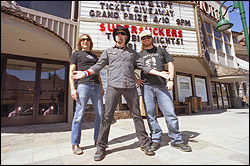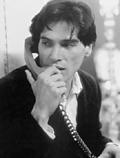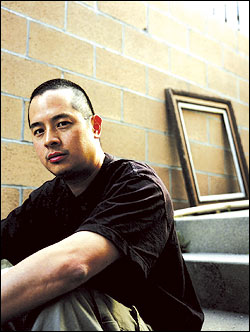The Supersuckers—currently, vocalist and bassist Eddie Spaghetti (born Edward Carlyle Daly III), guitarist Ron “Rontrose” Heathman, and drummer Mike Musburger—formed in Tucson, Ariz., in 1988. Originally a five-piece that included drummer Dan Siegal, who left the group two years ago, the band, formerly called the Black Supersuckers (the name came from a pornographic novel), concentrated on hard-charging, rockabilly-inflected, straight-ahead punk and recorded several 7-inch singles for various labels, later collected on 1992’s The Songs All Sound the Same. Soon, they signed to Sub Pop and released their first album, 1992’s The Smoke of Hell, with a cover by artist Daniel Clowes (whose books Eightball and Ghost World were issued by local indie publisher Fantagraphics). They also became one of the most dependable live bands in the business, accruing a steady, fervent cult following across the country. “I can see the Supersuckers every couple weeks if I want to,” I told a rock-DJ friend in Minneapolis shortly after moving to Seattle in 1999. “Fuck you,” he replied.
After four albums on Sub Pop, including 1997’s country foray, Must’ve Been High, and another, 1999’s Evil Powers of Rock ‘n’ Roll, on Koch International, the Supersuckers went full-on DIY, starting Mid-Fi Recordings, their own label. Their newest disc, released three weeks ago, is the singles and obscurities collection Devil’s Food: A Collection of Rare Treats & Evil Sweets, which joins three live discs (taped in Anaheim, Calif.; in Ferndale, Mich.; and at Seattle’s Tractor Tavern) and Spaghetti’s 2004 solo disc, The Sauce, in the Mid-Fi catalog. Shortly after getting off their umpteenth tour, Spaghetti and Heathman journeyed to the SW offices for this Jury, ranking each song on its appropriateness for an actual jukebox in an actual bar.
ZZ Top: “La Grange” (1973) from Tres Hombres (Warner Bros.)
Eddie Spaghetti: Oh, rules! I was thinking about ZZ Top yesterday, because I heard somebody saying, “What’s the longest-running rock and roll band with all the original members?” I said, “It’s gotta be ZZ Top.”
Ron Heathman: Yeah, that’s true.
Spaghetti: I thought about Cheap Trick, but they’ve had a rotating cast of characters.
Heathman: Yep, and I think ZZ Top started before ’em—’69, Jesus Christ.
Spaghetti: And like all bands that have sucked in their old age, you kind of have to just forget about that. I still think they’re great live. Their records, you know, there’s an occasional glimmer of what they used to do. But I mean, I’m on board all the way through Afterburner. I’m not a purist that says they started stinking at Deguello or whatever. They started changing then, but I still think they made great records.
Seattle Weekly: They only make records about twice a decade now, anyway.
Spaghetti: Yeah, so that’s pretty forgivable. They’re not gonna bug us too much.
Heathman: They made six records with not one single bad song on them, six in a row—their first six records. Not one single stinker. You’re in, you’re done—you can rest on that. This record particularly, their vibe, their style . . . let me just say I didn’t expect to hear ZZ Top [during this interview].
Spaghetti: I thought we were going to hear the Shins, modern rock—and maybe we will. But this is a jukebox staple. As far as a jukebox goes, you put this on in a bar, and every single person’s happy. My sister was older, and this is one of the first concerts I got to see. She took me in 1978, with the Charlie Daniels Band. I was 11 years old. She took me to a couple before that, too, and they were boring. I was a little kid. I don’t remember the concert so much as people dancing, this big concert with people dancing. I don’t remember that at other concerts I went to as a little kid. It was fun.
SW: Rock stopped being dance music for a long time—punk rock kind of turned into head music for a while there.
Spaghetti: You’re supposed to think, and you’re supposed to have this arsenal of previous knowledge in your mind in order to appreciate certain bands and certain kinds of rock. I don’t like most of what’s on the radio, but when you do hear a song you’ve never heard before by a new band but it’s just good, it’s so nice. You don’t have to have this litany of information and be this rock scholar in order to appreciate it: “If you liked Devo and you liked Kraftwerk,” it just goes on and on.
Heathman: [as song fades out] That is some clean boogie.
Helmet and House of Pain: “Just Another Victim” (1993) from Judgment Night (Sony)
Spaghetti: My immediate response is that I don’t understand it. Nü-metal?
SW: It actually predates nü-metal.
Heathman: Maybe it was influential to nü-metal, like Slayer or something.
SW: It’s a collaboration.
Heathman: Suicidal [Tendencies]?
SW: No. It’s a rock band and a rap artist collaborating.
Heathman: Like Anthrax and Public Enemy? Body Count?
SW: Helmet and House of Pain.
Heathman: I kinda call Helmet nü-metal.
Spaghetti: Yeah, they had that one good song that sounded to me like Ozzy Osbourne.
Heathman: “In the Meantime,” yeah, that song is killer. I’ve got that on the ‘Pod.
Spaghetti: But this is not a song I would ever put on the jukebox, because I feel like I would get in a bad mood.
Superchunk: “Slack Motherfucker” (1989) from Tossing Seeds (Merge)
Heathman: [after about 10 seconds] Alternachords.
SW: What?
Heathman: There’s a couple alternachords in there. [right after first chorus] See, there’s the alternachord.
Spaghetti and Heathman: [simultaneously] Foo Fighters.
Spaghetti: These guys have heard the Pixies.
Heathman: I’ve heard this band before. “Slack Motherfucker.” Is that Pavement?
SW: Superchunk.
Heathman: See? Alternachords.
Spaghetti: We were mad at them for being a “super” band before we were; I think they beat us by a year. So we were pretty irritated about that. And they got way more popular than we did for a while. We did a show with them quite a while back, and it was a lot of fun. They were really nice.
Heathman: The girl [Laura Ballance, Superchunk’s bassist], especially, she was super nice.
Spaghetti: She was tired of all of her wussy guys in the band, and she wanted to be around some, like, manly men, and she perceived us to be that [laughs].
Heathman: This was, like, 10 years ago [in] Munich, Germany. It was funny, because at the end of it, we had to do this encore thing, and we were all backstage, and Eddie was like, “Hey, Ron, go out there and play [Van Halen’s] “Eruption,” so I went out and started playing “Eruption.” She was cracking up, and the guy in the band was like, “Is he really going to go and play ‘Eruption’?”
Spaghetti: It was very unironically done, for the love of something very rock-shtick like that.
Heathman: Ten years ago, that was not a cool thing to do. [The song ends.] That’s their best song. They put the first wheel on the alternachord.
Mohammed Rafi: “Jaan Pehechaan Ho” (1965) from Ghost World (Shanachie)
Spaghetti: Perez Prado?
SW: It’s not Latin.
Heathman: I like it. This’d be good on a jukebox.
Spaghetti: Yeah, it’s like, everybody’s happy again. It’s dancey, it’s fun, it’s got a tough little guitar line in there. It would work in a certain bar.
Heathman: This and “La Grange” would work in any bar. Even bikers wouldn’t turn this off.
SW: Do you consider bikers a big part of your own audience?
Spaghetti: No. We appeal to that sort of denominator a bit through our love of tough rock, but if you get to know us, we’re anything but bikers.
Heathman: And if you get to know some bikers they’re anything but bikers. There’s a perception that people are a certain way. When I say that, I just picture a bar somewhere in Montana with a jukebox and a lot of taxidermy. It’s gonna have [Patsy Cline’s] “Crazy” on it, and it better have “La Grange.” And if this came on, it’d surprise some people, but I think they’d think it’s cool.
SW: It’s Mohammed Rafi, an Indian soundtrack singer, from 1965. It was used as the opening theme music for the movie Ghost World. I’m playing it because I wanted to ask about working with Daniel Clowes, who drew the cover of your album, The Smoke of Hell.
Spaghetti: Ghost World was a great comic, and the movie was actually good, too. We didn’t work directly with him too much. Through our relationship with Sub Pop, we were instantly and gratefully entered into this world that was much more artistic than we would have ever been on our own. Somebody had some Eightball comics . . .
Heathman: I had a bunch of them.
Spaghetti: . . . and they were like, “We can hook you up with Dan Clowes,” ’cause they knew that we liked that comic. We thought, “We’re gonna meet him, he’s gonna be a fan,” and none of that happened [laughs]. But he did do a great job. He actually got the title of the record wrong, so we sent it back—I think he was a little irritated. But hey, we’re not the ones who got it wrong.
Hole: “Teenage Whore” (1991) from Pretty on the Inside (Caroline)
Heathman: Sonic Youth?
Spaghetti: Sounds like Courtney.
SW: Yes, it’s Hole’s first record.
Spaghetti: My wife loves that record. And I actually love Courtney—the idea of Courtney way more than the reality. It’s one of those things where the world could really use—and has really used—Courtney [laughs]. You really don’t want to do the barometer thing against her. I don’t like this song very much. But I loved that last “Mono” song. Jeez, that’s a cool tune.
Heathman: Her last record, I thought, had a couple hits on it.
SW: It’s a good record, but the public perception weighs against her.
Heathman: Oh yeah. And she did that herself.
Spaghetti: She’s no longer an artist who makes music—she’s a whole stereotype unto herself. If you say someone’s like Courtney Love, everybody knows, whether they’ve heard her music, what you’re talking about.
SW: I was also wondering about your coming up to Seattle, which is around the time of this album. Did you feel like you were part of that particular scene? Did you like the city?
Spaghetti: We came up here in May of ’89. She didn’t exist yet in anybody’s mind, really. I met her the first time when I went on a guitar touring gig with the Best Kissers in the World, a band back then, and she was sort of loosely dating the bass player back then. She was totally rude to me and didn’t say but three words to me, so I never liked her. After that, she was already around. I thought she had a cool name.
SW: There’s a kind of legendary story about Lois Maffeo starting a band called Courtney Love.
Spaghetti: For a while, it was confusing— I didn’t know if there was a difference. Moving to Seattle for us was something we did because my same buddy who was dating Courtney moved up from Phoenix about a year before. He called us and said, “It’s great up here, [you] should come.”
Heathman: We didn’t know anything about Sub Pop.
Spaghetti: We went and stuffed singles. They had that tiny little office in the Terminal Sales Building. That’s where we heard [Nirvana’s] Bleach for the first time. It was about to come out; they had a tape of it. It blows my mind how quickly the tape was gone. We suddenly realized, “Boy, we’ve got to be good.” We still haven’t gotten nearly as popular as tons of those bands.
SW: In a way, though, you escaped being stereotyped as a “Seattle band” during that period.
Heathman: There was definitely a stigma. We were out there, touring in a van, on Sub Pop, and no one really knew too much who we were. It was a time when, if you said you were from Seattle, you’d get some eye-rolling at you. It was like, “It’s a city.”
Spaghetti: We are still around and we’re still a valid deal, and I think that’s all part of our genre- or label-ducking a bit. Anytime we started getting tagged with something, we were kind of careful to brush it off.
Willie Nelson: “Blue Eyes Crying in the Rain” (1975) from Red Headed Stranger (Legacy)
Spaghetti: [immediately] He called me on my birthday a couple weeks ago.
SW: That’s really sweet.
Spaghetti: It was un-fucking-real. I’m hanging out in Arizona before the start of this tour we just got off of. I’m at my dad’s place, and my wife’s standing there, and my phone rings. I didn’t recognize the number, and I answered it, which I rarely do if I don’t recognize the number. He’s like, [in imitation] “Eddie? Hey, it’s Willie Nelson.” Like he needs the last name [laughs]. “I hear it’s your birthday.” He sang me a brand-new song he’d just finished writing—five verses of it. It’s got five verses, and he sang me each and every one. After a couple, I was like, “Wow, I can’t believe . . . ” And he’s, “Yeah, yeah, yeah—here’s another verse” [laughs]. I was walking on—I mean, when I think about it, I still get pretty high.
SW: Obviously, you worked together. How did it come about?
Heathman: We used to cover “Whiskey River,” and we played a show in Austin. Someone who worked at a record label heard our cover and said, “You know, Willie would really like to hear that.” Through that, we got to record with him.
Spaghetti: That same [label owner] wanted to do a tribute record—it wound up being that record, Twisted Willie. We recorded “Bloody Mary Morning.” We were in Texas recording our Sacrilicious record, so he got Willie to come into the studio. We were like, “No way, it’s not going to happen.” Totally did. He came in, played some guitar and sang, and passed around some left-handed cigarettes and some cans of Lone Star. Ever since then, he’s just sort of kept in touch. He invited us to play Farm Aid.
Heathman: We got to know his family. For promotion for the record, he tapped us as the band, so we went on Leno, backing him up, doing that track. He could have picked any one of those people.
SW: You don’t say no to Willie Nelson, do you?
Heathman: No.
Spaghetti: And why would you?
Heathman: One of his daughters just got married, and we just recently played her wedding reception at his manager’s little roadhouse bar and grill.
Spaghetti: It’s been one of those things that a band like us gets. We’re not hanging platinum records on the wall. But we’ve got tons of these cool relationships and rock and roll moments you can never take away from us. No amount of payola gets you a relationship with Willie Nelson.
Heathman: P. Diddy can buy a lot of things, but he can’t buy that.
Spaghetti: And that song in a jukebox, anywhere—to know a person who’s recorded and written these songs . . . you’re going to hear “Crazy.” Your kids’ kids’ kids are going to hear “Crazy.” To know this person, it’s pretty unbelievable. You get down on your band ’cause it’s small and nothing ever seems to change, commercially speaking; you can beat yourself up about it. But then you think, “Willie Nelson likes our band, so fuck ’em.”
SW: His career would seem like a model in that regard; he didn’t break big for a long time.
Heathman: Till he was in his 40s, [staying] on the road, yeah.
Spaghetti: I think for us to think about country artists, which we do, as sort of a template for our careers is much smarter. Rock and roll is such a new art form in general; say it started in ’55—that’s still only 50 years old. It’s going to be much more common for artists like us to do it forever.









